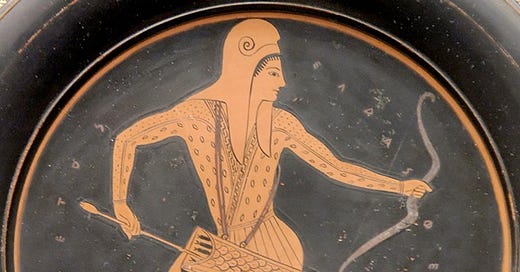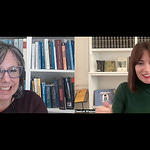Dear Classical Wisdom Member,
Where would we be without the Scythians?
I’m going to go out on a limb here and guess this is probably not a question you have asked yourself... at least not recently.
And yet these equestrian nomadic peoples had a huge impact on the ancient world...and so logically, on us too!
Integral to the Silk Road, known for their metalworking, and their inability to be defeated by the Greeks and the Romans (but not the Sarmatians), the Scythians have a tendency of popping up at times in the most unlikely places.
For instance, the whole notion of the AD system did not come into being until AD 525 when a Scythian monk living in Rome (Dionysius Exiguus or "Dionysius the Humble") took it upon himself to date the years from Christ’s incarnation.
Or in Athens, a group of 300 Scythian slaves (the ῥαβδοῦχοι, "rod-bearers") were used to guard public meetings to keep order and for crowd control. They dealt with criminals, handling prisoners, and making arrests... the original ancient police.
Up in Macedonia, at the center of the Vergina tomb, the supposed burial of Alexander the Great’s father, Philip I, a mysterious, controversial weapon was found in Tomb II... a female ‘warrioress’ holds a gold-plated Scythian bow-and-arrow quiver like those carried by Scythian archers...
Which of course, brings us to one of the most popular myths to inspire the ancient Greeks (evidenced by the sheer quantity of pottery scenes dedicated to it)....
The Amazons!
Indeed, the ancients were well aware that the women to whom they referred to as Amazons were actually Scythians, the nomadic people who lived in small tribes within the vast territory of Eurasia, who were famous for their mounted warfare, horse culture, and awesome leggings. (Can someone PLEASE bring them back?)
But who were these people? The ones the Greek ‘historian’ Herodotus praised for their invincibility:
But the Scythian race has in that matter which of all human affairs is of greatest import made the cleverest discovery that we know; I praise not the Scythians in all respects, but in this greatest matter they have so devised that none who attacks them can escape, and none can catch them if they desire not to be found. For when men have no established cities or fortresses, but all are house-bearers and mounted archers, living not by tilling the soil but by cattle-rearing and carrying their dwellings on wagons, how should these not be invincible and unapproachable? - Herodotus Book IV
Today, dear Member, we will find out... from the fascinating evidence found in their language and their strange burial grounds to their tendency to travel with cats... in today’s Podcast with Professor Christopher Beckwith.
But before you start exploring the wonderful world of the Scythians - a quick matter of important housekeeping:
We have only FIVE cabins remaining for our Voyage, Emperors, Conquerors, and Saints, departing September 14th, 2024.
If you are interested in taking part of this exciting trip, make sure to act now:
All the best,
Anya Leonard
Founder and Director
Classical Wisdom
Classical Wisdom’s Podcast with Professors:
Who were the Scythians? Why were they both so important, yet rarely discussed? And how can we see their impact today?
Today’s Podcast with professors is with Christopher I. Beckwith, an American philologist and distinguished professor in the Department of Central Eurasian Studies at Indiana University in Bloomington, Indiana. He is author of many books, including his most recent one: The Scythian Empire: Central Eurasia and the Birth of the Classical Age from Persia to China, of which we speak about today.
We delve into language as an identity, modern Scythians and myth making and why we should listen to Herodotus a lot more... Watch above or listen below.
Listen to this episode with a 7-day free trial
Subscribe to Classical Wisdom to listen to this post and get 7 days of free access to the full post archives.














